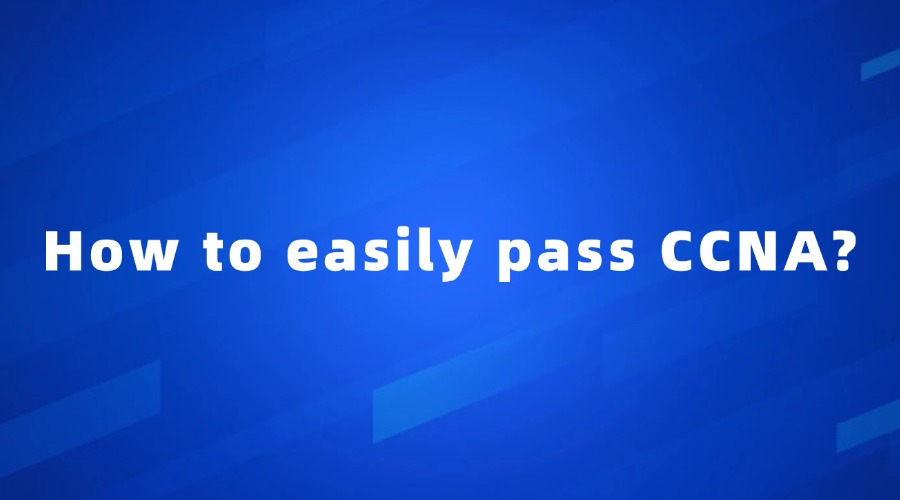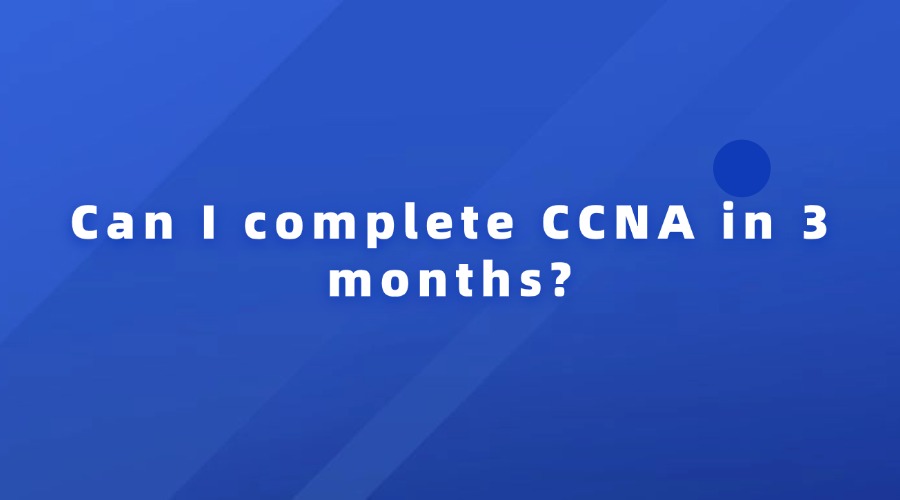Is CCNA exam difficult?
Update time:2024-11-02
The Cisco Certified Network Associate (CCNA) exam is one of the most popular and recognized certifications in the IT industry. Many aspiring network professionals wonder, “Is the CCNA exam difficult?” While the difficulty of the exam varies depending on your experience, preparation, and knowledge, the CCNA exam is certainly challenging due to its comprehensive nature. It covers a wide range of topics related to networking, security, automation, and IP services, and tests both theoretical knowledge and practical skills.

In this article, we will break down the factors that contribute to the perceived difficulty of the CCNA exam and offer insights into how you can effectively prepare for it.
1. Comprehensive Exam Content
The first aspect that makes the CCNA exam challenging is the breadth of the topics it covers. The exam is designed to test your knowledge across multiple areas of networking, from basic fundamentals to more advanced concepts. These topics are essential for network professionals and include:
Network Fundamentals: This covers the OSI and TCP/IP models, IP addressing (including IPv4 and IPv6), subnetting, and how switches and routers operate. Understanding these core concepts is vital for any network technician or engineer.
Network Access: You’ll need to be familiar with how devices gain access to the network, including wired and wireless technologies, switches, VLANs (Virtual Local Area Networks), and Spanning Tree Protocol (STP).
IP Connectivity: This area tests your understanding of routing concepts, static and dynamic routing protocols, and how routers direct traffic across different networks.
IP Services: This includes essential services such as DNS (Domain Name System), DHCP (Dynamic Host Configuration Protocol), and NAT (Network Address Translation), which are crucial for managing network traffic and services.
Security Fundamentals: As network security is a critical aspect of any network, the exam covers topics like access control lists (ACLs), VPNs (Virtual Private Networks), and device hardening.
Automation and Programmability: With the rise of software-defined networking (SDN) and network automation, the CCNA exam now includes sections on automation tools like Python and network programmability concepts.
Because the exam covers such a broad range of topics, candidates must have a solid understanding of many different networking areas, which can be daunting for those who are not fully prepared.
2. Hands-On Practical Knowledge
One of the challenges of the CCNA exam is that it doesn’t just test theoretical knowledge—it also tests practical, hands-on skills. In addition to traditional multiple-choice questions, the exam includes simulation questions, where you will be required to configure and troubleshoot networks. This means that candidates must know not only the theory but also how to apply it in real-world scenarios.
For example, you may be asked to:
Configure a router or switch with a specific IP addressing scheme.
Set up VLANs and ensure they are properly routed between switches.
Implement and troubleshoot static and dynamic routing protocols, like OSPF (Open Shortest Path First) and EIGRP (Enhanced Interior Gateway Routing Protocol).
Secure network devices by configuring ACLs and applying security best practices.
This hands-on requirement can be difficult for candidates who haven’t spent enough time practicing with real or simulated networking devices. Experience working with Cisco devices or using network simulators like Cisco Packet Tracer or GNS3 is essential to doing well on the exam.
Contact me immediately to get the golden key helping you fast express your certificate. 3. Time Pressure
The CCNA exam has a duration of 120 minutes, during which candidates must answer between 100 and 120 questions. The exam includes a variety of question types, such as:
Multiple-choice questions
Drag-and-drop questions
Fill-in-the-blank questions
Simulation-based questions
The time constraint can add a layer of difficulty for many candidates. Given the mix of theoretical and practical questions, managing your time effectively is crucial. You need to balance the time spent on each question to ensure you have enough time to complete the exam. Simulation-based questions can be particularly time-consuming, as they require you to configure and troubleshoot network devices.
One of the best ways to overcome the time pressure is by taking timed practice exams before the actual test. This will help you get a feel for the pace at which you need to answer questions and give you confidence in managing your time during the exam.
4. Experience Level
The difficulty of the CCNA exam largely depends on your prior experience and knowledge. For those who are new to networking, the CCNA exam can be quite challenging. The sheer volume of material to study, combined with the practical application of the concepts, can be overwhelming.
On the other hand, individuals with hands-on networking experience may find the exam easier to manage, as they’ve likely encountered many of the concepts in real-world scenarios. However, even experienced professionals need to review the specific topics covered by the exam and practice hands-on configurations to ensure they are ready.
5. Preparation and Study Time
Proper preparation is key to overcoming the difficulty of the CCNA exam. Many people underestimate the time and effort required to pass the exam. On average, candidates spend anywhere from 3 to 6 months preparing, depending on their background.
Here are some effective strategies for exam preparation:
Study Materials: Cisco provides official study guides, video courses, and practice tests that are specifically tailored for the CCNA exam. These resources are essential for understanding the exam topics in detail.
Practice Labs: Hands-on experience with networking equipment or simulators like Packet Tracer or GNS3 is crucial. You should practice configuring routers, switches, and troubleshooting networks until you are comfortable with the tasks.
Online Communities: There are numerous online forums and communities, such as Cisco Learning Network, where you can ask questions, share resources, and get tips from others preparing for the CCNA exam.
Practice Exams: Taking practice exams helps you get familiar with the exam format, understand the types of questions asked, and identify areas where you need more study.
6. Exam Format
The CCNA exam includes various types of questions, such as:
Multiple-choice: These questions require you to select one or more correct answers from a list of options.
Drag-and-drop: You may be asked to drag items into their correct places on a network diagram or match terms with their definitions.
Fill-in-the-blank: Some questions will require you to type the correct command or configuration based on a given scenario.
Simulations: These are hands-on tasks where you will configure and troubleshoot a simulated network environment.
The combination of different question formats, especially simulation-based questions, makes the exam more interactive but also more difficult. You will need to be proficient in network configuration to answer these questions correctly.
Conclusion
The CCNA exam is considered challenging due to its wide range of topics, hands-on requirements, time pressure, and comprehensive nature. However, with the right preparation, study plan, and hands-on practice, the difficulty can be managed. Whether you’re new to networking or have some experience, investing time in learning the exam topics and practicing network configurations will increase your chances of passing and earning the valuable CCNA certification.
I'm your man who have the 100% valid dumps , buy it now for 50% off to clear your exam!
Click it ↓↓

In this article, we will break down the factors that contribute to the perceived difficulty of the CCNA exam and offer insights into how you can effectively prepare for it.
1. Comprehensive Exam Content
The first aspect that makes the CCNA exam challenging is the breadth of the topics it covers. The exam is designed to test your knowledge across multiple areas of networking, from basic fundamentals to more advanced concepts. These topics are essential for network professionals and include:
Network Fundamentals: This covers the OSI and TCP/IP models, IP addressing (including IPv4 and IPv6), subnetting, and how switches and routers operate. Understanding these core concepts is vital for any network technician or engineer.
Network Access: You’ll need to be familiar with how devices gain access to the network, including wired and wireless technologies, switches, VLANs (Virtual Local Area Networks), and Spanning Tree Protocol (STP).
IP Connectivity: This area tests your understanding of routing concepts, static and dynamic routing protocols, and how routers direct traffic across different networks.
IP Services: This includes essential services such as DNS (Domain Name System), DHCP (Dynamic Host Configuration Protocol), and NAT (Network Address Translation), which are crucial for managing network traffic and services.
Security Fundamentals: As network security is a critical aspect of any network, the exam covers topics like access control lists (ACLs), VPNs (Virtual Private Networks), and device hardening.
Automation and Programmability: With the rise of software-defined networking (SDN) and network automation, the CCNA exam now includes sections on automation tools like Python and network programmability concepts.
Because the exam covers such a broad range of topics, candidates must have a solid understanding of many different networking areas, which can be daunting for those who are not fully prepared.
2. Hands-On Practical Knowledge
One of the challenges of the CCNA exam is that it doesn’t just test theoretical knowledge—it also tests practical, hands-on skills. In addition to traditional multiple-choice questions, the exam includes simulation questions, where you will be required to configure and troubleshoot networks. This means that candidates must know not only the theory but also how to apply it in real-world scenarios.
For example, you may be asked to:
Configure a router or switch with a specific IP addressing scheme.
Set up VLANs and ensure they are properly routed between switches.
Implement and troubleshoot static and dynamic routing protocols, like OSPF (Open Shortest Path First) and EIGRP (Enhanced Interior Gateway Routing Protocol).
Secure network devices by configuring ACLs and applying security best practices.
This hands-on requirement can be difficult for candidates who haven’t spent enough time practicing with real or simulated networking devices. Experience working with Cisco devices or using network simulators like Cisco Packet Tracer or GNS3 is essential to doing well on the exam.
Contact me immediately to get the golden key helping you fast express your certificate. 3. Time Pressure
The CCNA exam has a duration of 120 minutes, during which candidates must answer between 100 and 120 questions. The exam includes a variety of question types, such as:
Multiple-choice questions
Drag-and-drop questions
Fill-in-the-blank questions
Simulation-based questions
The time constraint can add a layer of difficulty for many candidates. Given the mix of theoretical and practical questions, managing your time effectively is crucial. You need to balance the time spent on each question to ensure you have enough time to complete the exam. Simulation-based questions can be particularly time-consuming, as they require you to configure and troubleshoot network devices.
One of the best ways to overcome the time pressure is by taking timed practice exams before the actual test. This will help you get a feel for the pace at which you need to answer questions and give you confidence in managing your time during the exam.
4. Experience Level
The difficulty of the CCNA exam largely depends on your prior experience and knowledge. For those who are new to networking, the CCNA exam can be quite challenging. The sheer volume of material to study, combined with the practical application of the concepts, can be overwhelming.
On the other hand, individuals with hands-on networking experience may find the exam easier to manage, as they’ve likely encountered many of the concepts in real-world scenarios. However, even experienced professionals need to review the specific topics covered by the exam and practice hands-on configurations to ensure they are ready.
5. Preparation and Study Time
Proper preparation is key to overcoming the difficulty of the CCNA exam. Many people underestimate the time and effort required to pass the exam. On average, candidates spend anywhere from 3 to 6 months preparing, depending on their background.
Here are some effective strategies for exam preparation:
Study Materials: Cisco provides official study guides, video courses, and practice tests that are specifically tailored for the CCNA exam. These resources are essential for understanding the exam topics in detail.
Practice Labs: Hands-on experience with networking equipment or simulators like Packet Tracer or GNS3 is crucial. You should practice configuring routers, switches, and troubleshooting networks until you are comfortable with the tasks.
Online Communities: There are numerous online forums and communities, such as Cisco Learning Network, where you can ask questions, share resources, and get tips from others preparing for the CCNA exam.
Practice Exams: Taking practice exams helps you get familiar with the exam format, understand the types of questions asked, and identify areas where you need more study.
6. Exam Format
The CCNA exam includes various types of questions, such as:
Multiple-choice: These questions require you to select one or more correct answers from a list of options.
Drag-and-drop: You may be asked to drag items into their correct places on a network diagram or match terms with their definitions.
Fill-in-the-blank: Some questions will require you to type the correct command or configuration based on a given scenario.
Simulations: These are hands-on tasks where you will configure and troubleshoot a simulated network environment.
The combination of different question formats, especially simulation-based questions, makes the exam more interactive but also more difficult. You will need to be proficient in network configuration to answer these questions correctly.
Conclusion
The CCNA exam is considered challenging due to its wide range of topics, hands-on requirements, time pressure, and comprehensive nature. However, with the right preparation, study plan, and hands-on practice, the difficulty can be managed. Whether you’re new to networking or have some experience, investing time in learning the exam topics and practicing network configurations will increase your chances of passing and earning the valuable CCNA certification.
I'm your man who have the 100% valid dumps , buy it now for 50% off to clear your exam!
Click it ↓↓
Previous:What does the CCNA exam consist of?














